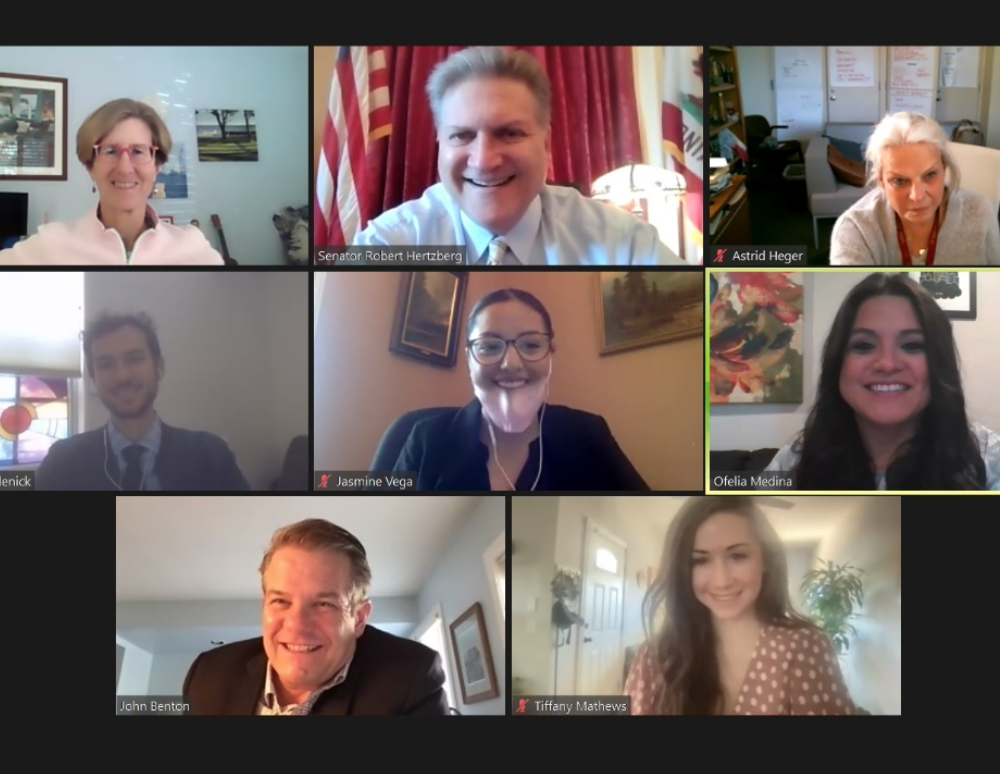May 27, 2021 | 11 Minute Read
What’s different about advocating for young children and their families in meetings with Sacramento lawmakers during a pandemic?
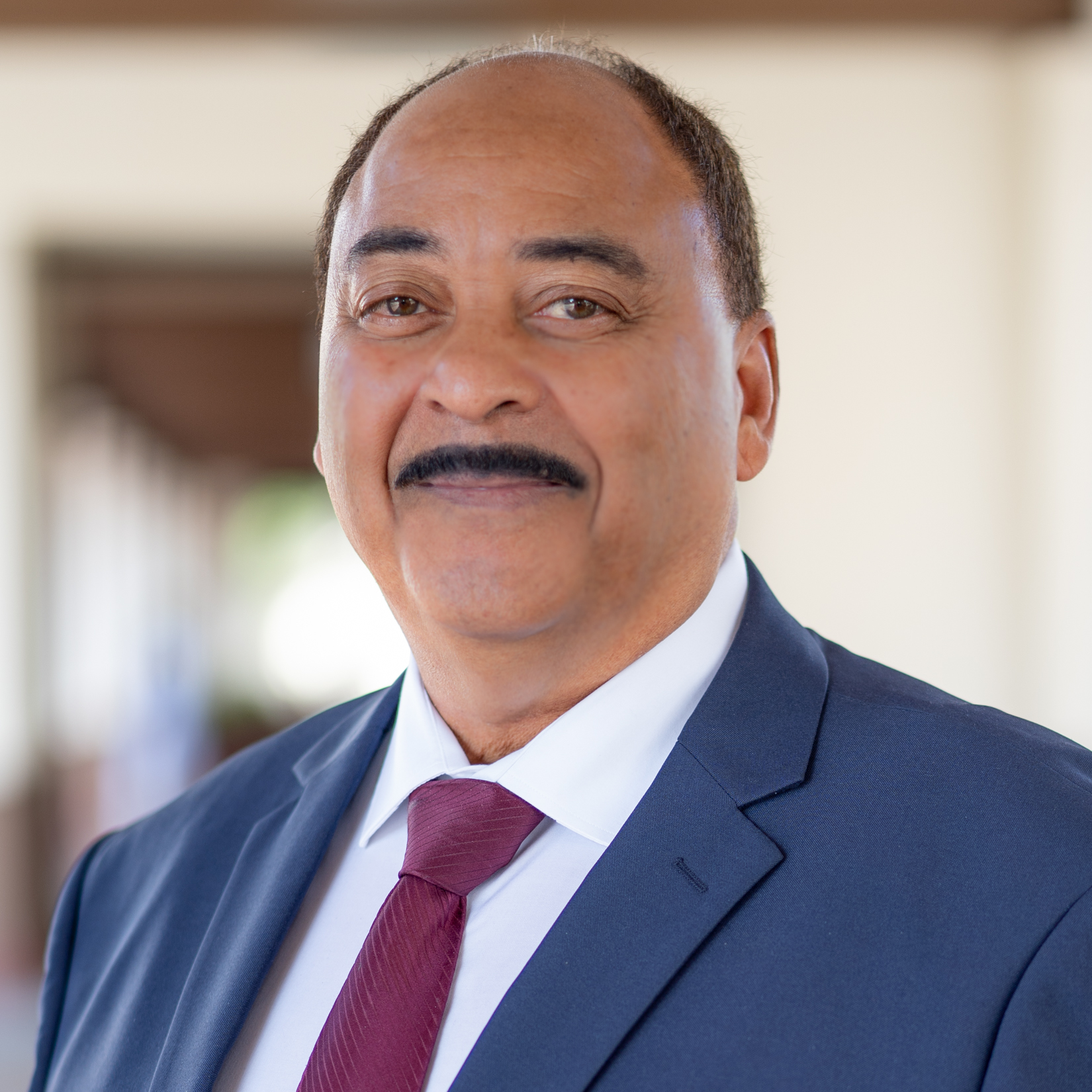
First 5 LA Commissioner Romalis Taylor
“One thing that is different — it’s hard to read the body language of people when trying to communicate with virtual technology,” said First 5 LA Commissioner Romalis Taylor, who met with state lawmakers and their staff via Zoom on April 27 during First 5 Advocacy Day, held in conjunction with the First 5 Association of California. “That’s an issue of virtual versus direct contact.”
Traditionally, First 5s statewide travel to Sacramento for Advocacy Day to meet with dozens of lawmakers and their staff in their offices at the state capitol. But when the pandemic emerged last year, the event was quickly and successfully transitioned to a smaller group of virtual meetings.
This year, there was a lot more body language to discern as First 5 LA conducted a whopping 27 virtual meetings during the two-day advocacy event. Fortunately, those in attendance were all speaking the same language: concern for early childhood development.
The 27 meetings were a testament to the recognition and reputation of the work by First 5 LA and First 5s statewide to advance priorities positively impacting young children and their families, especially during a pandemic year.
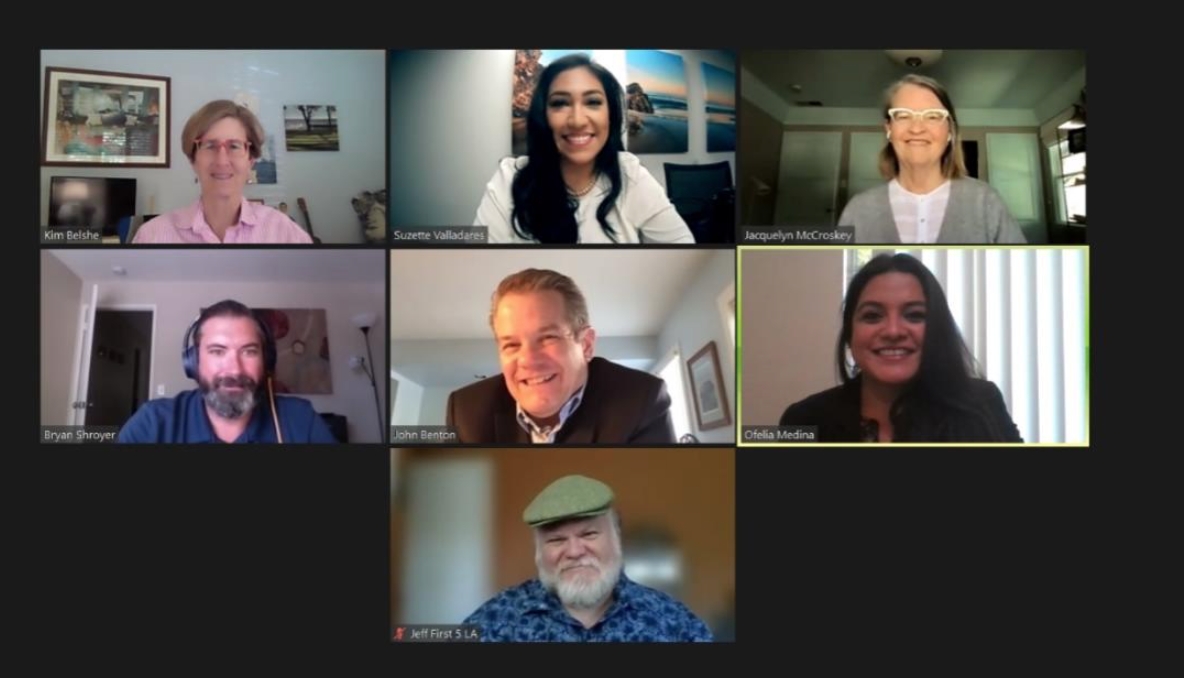
Meeting with Asm. Suzette Valladares
“I appreciate your work through this pandemic. It’s been so vital,” Assemblywoman Suzette Martinez Valladares (R-Santa Clarita) said during her meeting with the First 5 LA delegation. “It’s really important to hear your opinion on these bills.”
The impact of the pandemic permeated the First 5 LA delegation’s legislation and budget priorities, which encompassed the issues of early learning, family support and health (see full list of First 5 LA supported bills here). Equally important to the delegation was addressing the inequity of supports in systems serving families with young children in communities of color.
“A lot of our conversation and bills we supported, and our budget requests was with equity at the forefront,” said First 5 LA Senior Policy Strategist Ofelia Medina. “Whether it was compensating women of color at the forefront of early childhood education or highlighting budget priorities that are targeting families in communities that need it the most. Those tend to be communities of color and low income.”
BREAKING DOWN BARRIERS
In the meeting with Valladares, First 5 LA’s delegation pointed out that First 5 LA is working at the intersection of child and family-serving systems. The agency’s priority is to make sure that these systems work for families and to lower the barriers that are standing in the way, particularly for those families that have been historically neglected.
Many of these barriers — steeped in systemic racism and inequity — existed prior to COVID-19 in low-income communities and communities of color.
“COVID-19 has dramatically exacerbated what we know to be an already fragile and fragmented early childhood system of care,” First 5 LA Executive Director Kim Belshé told Valladares.
Communities of color have been hardest hit by the pandemic, suffering disproportionately high levels of infections and death, food insecurity and economic and social disruptions.
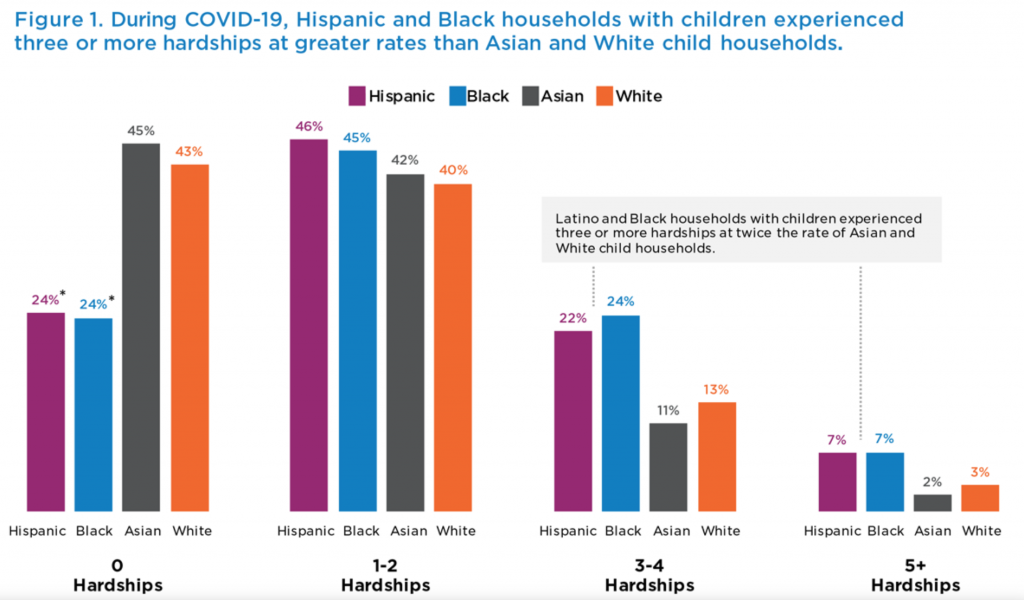
Child Trends: More than One in Four Latino and Black Households with Children Are Experiencing Three or More Hardships during COVID-19
According to Child Trends, 29 percent of Latino and 31 percent of Black households with children are experiencing three or more co-occurring economic and health-related hardships as a result of the pandemic. This is nearly twice the rate among Asian and White households with children (13 percent and 16 percent, respectively).
One such systems barrier to equity, Belshé said, can be found in health care access. She gave the example of a parent who must take a two-hour bus ride for a health service at a Federally Qualified Health Clinic (FQHC), then is turned away from receiving a second, similar service on the same day.
Belshé asked Valladares to support SB 316 (Eggman), which would allow Medi-Cal to reimburse FQHCs for two services when a patient receives a medical visit and mental health or dental visit on the same day at the same clinic location. This is particularly important after a year of intense struggles for many families due to the pandemic.
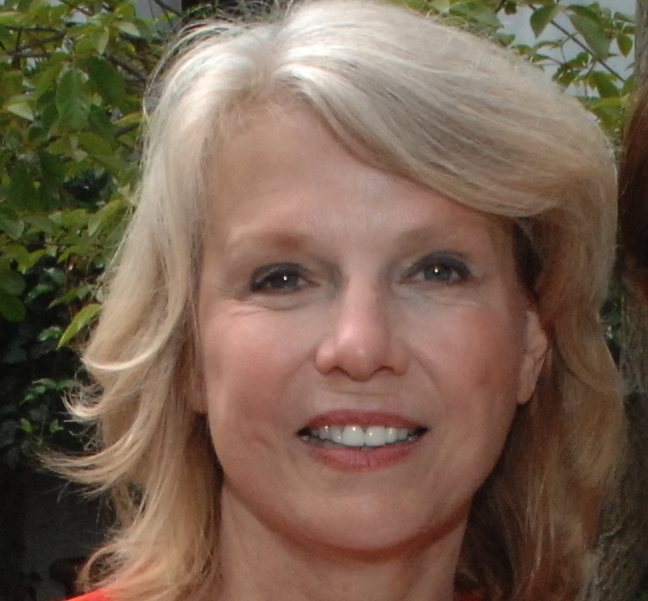
First 5 LA Commissioner Astrid Heger
“This is exactly the kind of systems barrier the legislature can bat down,” Belshé said.
Pediatrician and First 5 LA Commissioner Astrid Heger, in her meetings with Sacramento lawmakers, said this when it came to the bills First 5 LA supports: “The bottom line for me as a kid’s doctor is how does the bill keep kids alive and safe? With the coronavirus waning and kids going back to doctors, they need to have the best of care.”
AN (EARLY) LEARNING CURVE
In past Advocacy Days, Medina said, First 5 LA occasionally engaged in a primer on child care with lawmakers to emphasize the importance of early learning. This year’s pandemic quickly educated many lawmakers and other working Californians on the need for — and fragility of — the state’s early learning system.
“The last year has highlighted the industry and the need for support. Before, it was like doing Child Care 101,” Medina said. “This year, we didn’t have to do that. We just jumped right into talking about it.”
According to the California Child Care Resource and Referral Network, 33 percent of licensed child care centers and 14 percent of licensed family child care homes in California have closed their doors since the start of the pandemic. The UC Berkeley Center for the Study of Child Care Employment determined that nationwide, the child care workforce shrank by 20 percent —nearly 200,000 child care workers — within the first six months of the pandemic.
Prior to the pandemic, the state’s early learning system was already struggling to adequately meet the needs of families with long waitlists, inadequate funding and additional challenges faced by providers. As people return to work, child care will be an essential element in the recovery and future of California’s economy.
“We’ve all seen just how fragile our early childhood education system is through the lens of the pandemic,” First 5 LA Commissioner Jacquelyn McCroskey told Valladares.
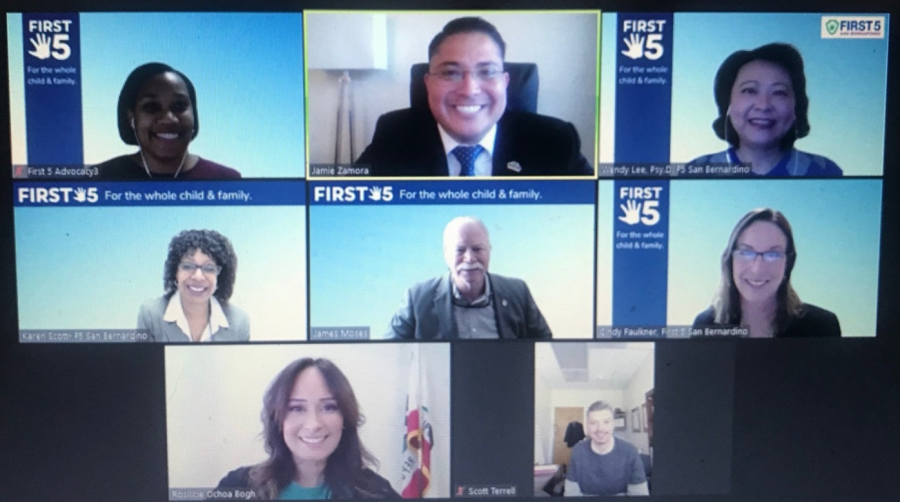
Sen. Ochoa Bogh meeting with First 5 LA, First 5 San Bernardino, and Child Care Resource Center (CCRC)
In partnership with the Early Childhood Education Coalition, the First 5 LA delegation asked Valladares and other lawmakers to back $7.8 billion in state and federal funding for early learning supports. Said McCroskey: “The Early Childhood Education Coalition is recognizing that we can’t rebuild the early childhood education system one piece at a time.”
The First 5 LA delegation also asked lawmakers to support legislation that would finally address compensation for a field that has historically been underpaid: child care providers.
“We know historically that child care providers have been paid basically next to nothing,” Medina said. “If we are thinking of economic stability of state of California, we can’t do that without thinking of child care. We are taking advantage of women of color who provide child care. It’s an opportunity to compensate them for the work they have done and was highlighted during COVID-19.”
First 5 LA asked lawmakers to support SB 246 (Leyva), which would replace the current bifurcated, unaligned reimbursement system with the Child Care Stabilization Formula, a single, regionalized state reimbursement rate for child care, preschool, and early learning services.
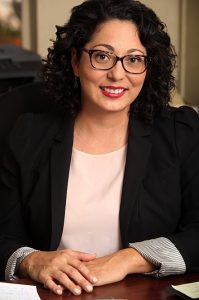
Assemblymember Cristina Garcia
In her meeting with the First 5 LA delegation, Assemblymember Cristina Garcia (D-Bell Gardens) recognized the impact of underpaid child care providers.
“We know that if we don’t shore up rates, they are not going to keep their doors open,” said Garcia, who also serves as the Chair of the California Legislative Women’s Caucus. “We know that’s just a piece of the ECE puzzle.”
Valladares was also engaged in the early learning discussion, bringing her experience to bear as a CEO of a nonprofit preschool and lawmaker specializing in early childhood education. She was particularly interested when the First 5 LA delegation asked for support of AB 92 (Reyes), which would establish a more equitable family fee sliding scale for state-subsidized early learning, alleviating the financial burden for low-income families.
“While it may seem like it’s not a lot of money, it’s a make-or-break deal for those families trying to make it through the week,” McCroskey said, noting that the pandemic has put an extra burden on low-income families.
“We have to take the pandemic into consideration,” Valladares said. “But I have noticed when families are invested in paying something, their child shows up every day. As a provider, you are stuck in a situation when, if a child does not show up, you don’t get funded for that day. It’s important that families pay some sort of fee. Should it be on what that family can afford? Absolutely.”
SUPPORTING FAMILIES
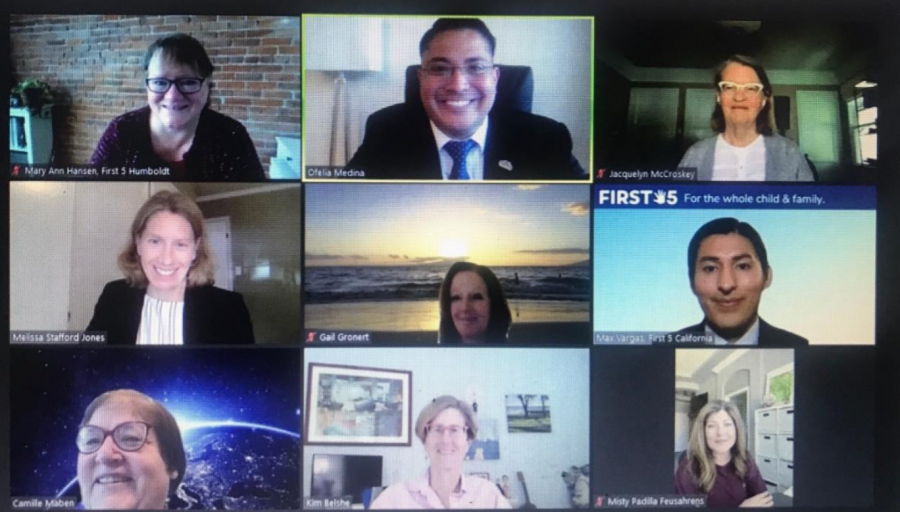
Meeting with Speaker Anthony Rendon’s staff, Gail Gronert, Special Assistant included First 5 Leadership from First 5 CA, First 5 Association, First 5 LA and First 5 Humboldt
Positive attachments between parent and child at the earliest stage of life promote optimal health, well-being and developmental outcomes in children. For the mother, short or no work leave following childbirth is associated with a higher likelihood of experiencing maternal depression and complications related to physical healing.
That’s why the First 5 LA delegation asked lawmakers to:
- Support AB 123 (Gonzalez), which would increase wage replacement provided by the California Paid Family Leave Program to 90 percent of a new parent’s wages, up from the current level of between 60 and 70 percent of earnings.
- Maintain all funding and staffing levels for home visiting programs regardless of temporary reductions in enrollment that have occurred during the pandemic.
Home visits can improve parents’ knowledge and skills, help develop social support systems, and can significantly improve access to education, health and community services. First 5 LA is the largest funder of voluntary home visiting in Los Angeles County, impacting thousands of families.
While enrollment in home visiting programs fell during the pandemic, First 5 LA’s home visiting partners adjusted by expanding telehealth and virtual home visits. Enrollment is expected to rise at the sunset of the pandemic, which has created even more challenges for vulnerable families who need supports now more than ever.
“Now is not the time to pull back resources when we need to support families,” Belshé said in the meeting with Garcia.
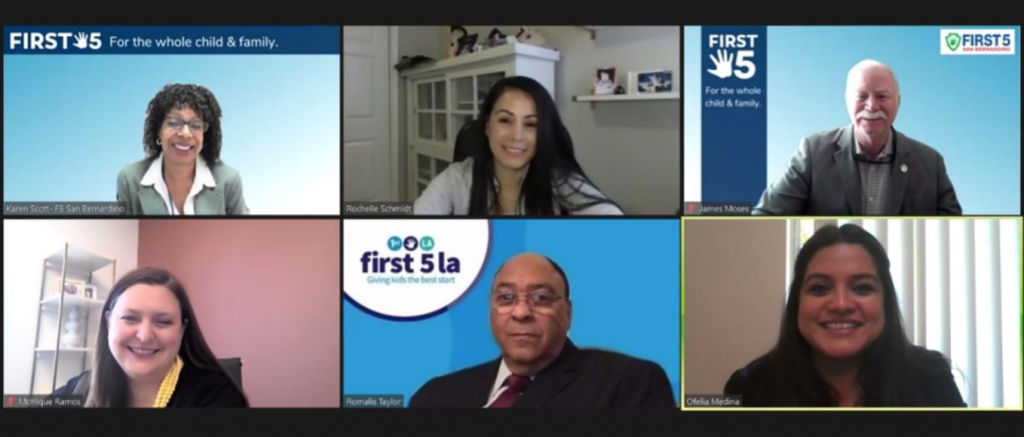
Meeting with Sen. Connie Leyva staffer, Rochelle Schmidt in partnership with First 5 San Bernardino
“For every $1 we spend on home visiting, we get $5.70 return from that in terms of improved health and academic performance of the child,” Taylor emphasized repeatedly in his meetings with lawmakers. “Beyond the pandemic, there is going to be a great demand and need for home visiting services.”
SEIZING THE OPPORTUNITY
Speaking of fiscal issues, California’s financial condition is much healthier than was anticipated at the start of the fiscal year, primarily due to recent federal investment, the stock market’s strength, and greater than expected tax revenue. This was a key point in asking lawmakers to prioritize investments and policies that change the existing complex and difficult-to-navigate systems that have long created barriers for families with young children to access.
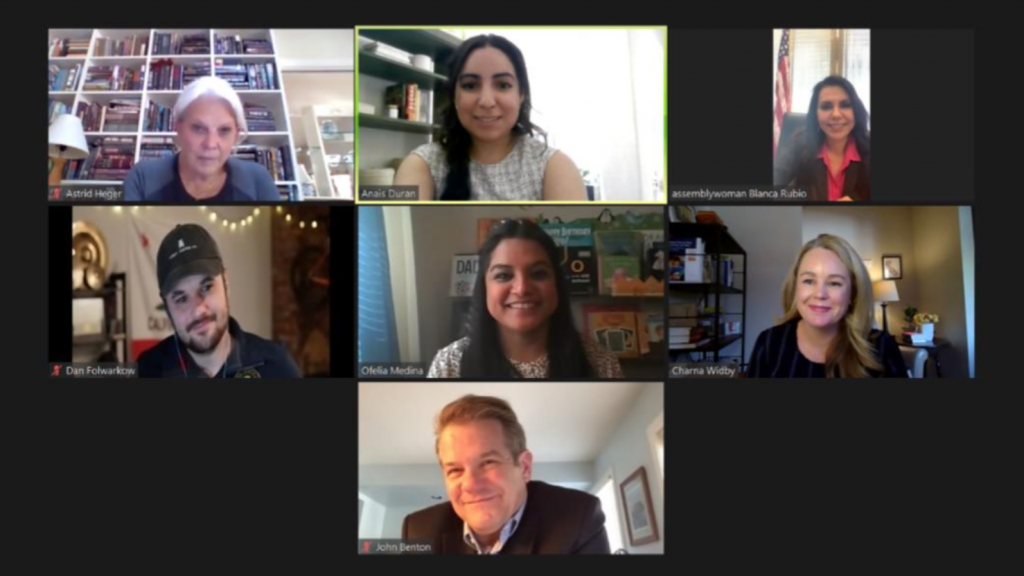
Meeting with Asm. Blanca Rubio
Seizing the opportunities provided by meeting virtually, First 5 LA Chief Government Affairs and Public Policy Officer Charna Widby said, “We were able to meaningfully connect with more of our Los Angeles County delegation of lawmakers. We also more narrowly focused our advocacy on impact and the urgent needs of families.”
This fusion of fiscal opportunity and virtual connection — combined with the hard-learned realities of the pandemic – created an environment that fostered a heretofore unseen level of support for early childhood development among lawmakers.
“Almost without fail, we had members or staff saying the Assemblymember or Senator supports the budget ask or this bill, especially given the extraordinary times we are in,” said First 5 LA Local Policy Specialist John Bamberg. “Prior to the pandemic, I don’t know if we were seeing this level of support.”
So what happens next?
“We have to keep the momentum going,” said First 5 LA Policy Analyst Andrew Olenick. “We don’t want to take our foot off the gas.”
“We are starting to see the light at the end of the tunnel,” said Government Affairs Strategist Anais Duran. “I’m hoping that once the pandemic ends, people continue to view early childhood development and equitable access to family-serving systems as a priority, and not that they are women’s or mothers’ or parent issues.”
(Editor’s Note: The First 5 LA Advocacy Day delegation, quoted in this article, also included First 5 LA Senior Government Affairs Strategist Jamie Zamora and California Strategies Partner John Benton)
